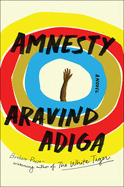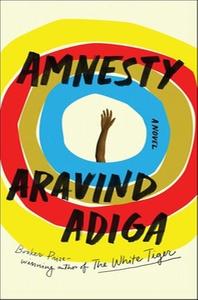
 "A man without rights in this world is not freed from his responsibilities." So thinks Danny, an undocumented worker in Sydney, Australia, upon realizing that he has information about a murder that by all rights should be reported to the police. Amnesty by Aravind Adiga (Last Man in Tower; The White Tiger) follows Danny, a Sri Lankan national, over the course of a day as he bargains with himself and conducts imaginary negotiations for asylum in exchange for helping the police with their investigation. As the minutes tick by--readers see each timestamp--the tension builds toward a resolution that seems anything but preordained.
"A man without rights in this world is not freed from his responsibilities." So thinks Danny, an undocumented worker in Sydney, Australia, upon realizing that he has information about a murder that by all rights should be reported to the police. Amnesty by Aravind Adiga (Last Man in Tower; The White Tiger) follows Danny, a Sri Lankan national, over the course of a day as he bargains with himself and conducts imaginary negotiations for asylum in exchange for helping the police with their investigation. As the minutes tick by--readers see each timestamp--the tension builds toward a resolution that seems anything but preordained.
Danny entered Australia legally as a student four years ago but dropped out of college and overstayed his visa. Almost immediately he realized the gravity of his mistake, and "from the day he had become an illegal, he had been trying to reverse things. To find some way around his decision." Yet he's not allowed to petition for an extension or apply for permanent residency precisely because he's in the country illegally. In spite of this conundrum, "I am never going back home," he says, and begins his life of hiding in plain sight. "A man needed a certain level of self-confidence even to become a refugee," he thinks, as he works as a housecleaner, dates a woman and moves around Sydney openly but always on guard. Luckily, most Australians--almost exclusively white--don't notice brown people. And, Danny observes, even those white people who want to "protect illegals from exploitation" can't be trusted. They'd be "lecturing you on your rights all the way to the deportation vehicle." He knows from witnessing the deportation of other undocumented workers that it doesn't matter if it's the police or a do-gooder trying to pin you down. "Idealism and corruption flowed side by side in Sydney like parallel streams of sewage."
After four years, Danny has convinced himself that he can live in Sydney indefinitely. So, the news of a body discovered at a nearby riverbed barely registers until Danny realizes it's Radha, one of Danny's former employers. Radha, along with her lover Prakash, discovered Danny's undocumented status without turning him in. Radha even patronized him, referring to Danny as "our little third world baby." When Danny hears details of Radha's murder, he suspects her lover is responsible and, unsure of what to do, calls him, hoping to hear some clue in Prakash's voice as to his guilt or innocence. This call proves to be a grievous error, because Prakash now knows that Danny has suspicions, and threatens to turn him into the police. "If I tell the Law about him, I also tell the Law about myself," Danny knows.
Amnesty moves quickly, as befits a hero on the run, and presents each character as fully formed and complex. Adiga's facility for the cadence and vernacular of street talk and self-talk gives voice, literally, to figures that are often unheard. Danny represents asylum-seekers around the globe who, unsafe in their own country and unwanted in others, wonder, "Where does it end, then, and who is responsible for what has been done to us?" --Cindy Pauldine, bookseller, the river's end bookstore, Oswego, N.Y.
Shelf Talker: Over the course of one day, an illegal worker in Australia debates whether to provide key evidence to the police in a murder investigation or remain in hiding.

